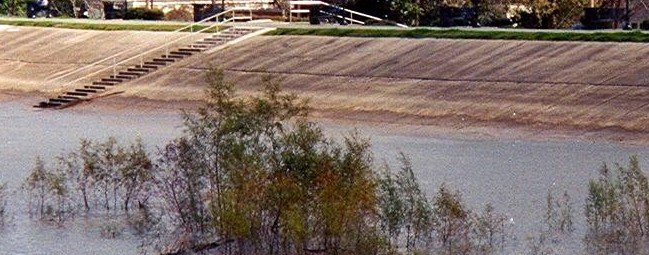This is the latest installment of our weekly series, The Language of the Blues, in which author and rock musician Debra Devi explores the meaning of a word or phrase found in the blues.
Grab a signed copy of Devi’s award-winning blues glossary The Language of the Blues: From Alcorub to ZuZu (Foreword by Dr. John) at Bluescentric.com. Also available as an eBook from Amazon Kindle.
A levee is a man-made embankment that keeps a river from flooding lowlands. The huge man-made levee holding back the Mississippi River is higher and longer than the Great Wall of China. It flanks the mighty river from Cairo, Illinois, to the south of New Orleans, with thirty-foot-high earthen walls on either side.
The Mississippi levee was begun piecemeal in the early 19th century when individual planters piled up small dykes to protect their fields from spring floods. By 1833, levee commissions had organized countywide efforts, but that all went to hell during the Civil War. After the war, levee boards coordinated efforts to build one huge levee and claim the fertile land of the Mississippi Delta for Southern farmers. Smaller levees were built to contain rivers in east Texas, Arkansas, and Louisiana.
The levees were built with the hard manual labor of convicts, and poor black and Irish laborers called “muleskinners.” Mules are known for being stubborn, but people who know mules say they are really just very smart. To train a mule, you have to outsmart it or “skin” it.
The muleskinners hauled dirt up the steep muddy slopes of the levees in wheelbarrows or in carts drawn by mule teams. Many men and mules were injured or killed when they lost their footing and tumbled down the slick embankments.
The levee camps, where workers lived in tents, drew thousands of freed slaves looking for work. While they worked, they improvised levee camp hollers to spur on themselves and their mules. These work songs had the seeds of the blues in their calls and refrains.
By the mid-1920s, working on the levee was the subject of numerous blues that expressed fear of the unsafe conditions on the levee and anger at being forced to work on it. Songs like Lonnie Johnson’s “Broken Levee Blues,” written after the great flood of 1927, tell the story of those who were forcibly conscripted to work on the levees, and threatened with jail if they refused the dangerous work:
They want me to work on the levee
They’re coming to take me down
I’m scared the levee may break and I might drown
The numerous levees built around rivers in the American South after the Civil War protected millions of acres of rich farmland that would not have been usable otherwise, as Mattie Delaney points out in “Tallahatchie River Blues”:
Tallahatchie River rising Lord it’s mighty bad
Some peoples on the Tallahatchie lost everything they had
Some people in the Delta wondering what to do
They don’t build some levees I don’t know what will become of you
To learn lots more, pick up a copy of The Language of the BluesM today!
Pick up a copy of Language of the Blues
Songs:
“Broken Levee Blues”- Lonnie Johnson (Alonzo Johnson)
“Levee Camp Moan”- Son House (Eddie James House, Jr.)
“Tallahatchie River Blues”- Mattie Delaney
Video:
Lonnie Johnson – “Broken Levee Blues”


